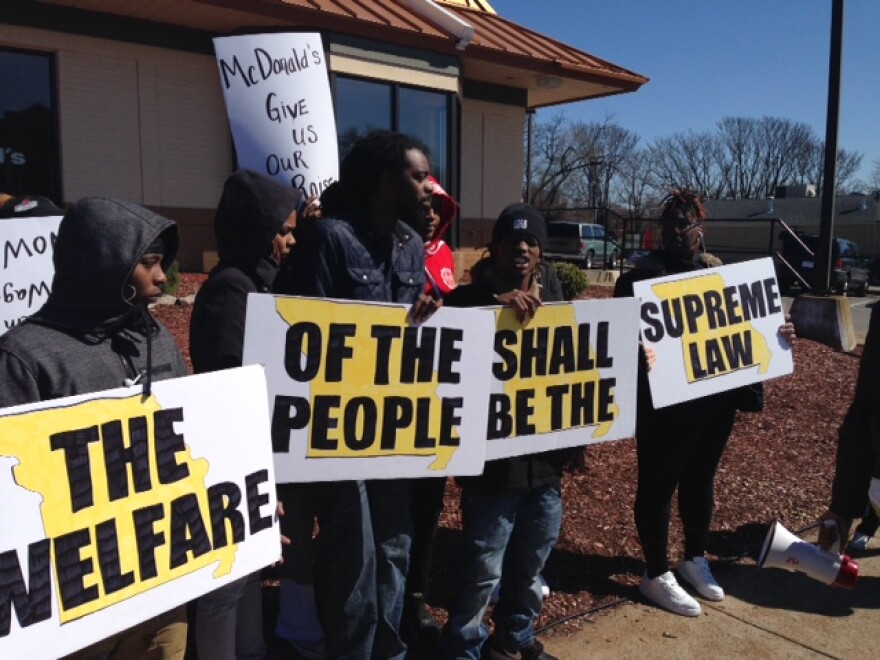Missouri’s workers will bear the brunt of sweeping policy changes that were approved during the 2017 session.
With Republicans firmly in control of the governor’s office and both chambers of the legislature, they took the opportunity to back long-awaited policy proposals, including making it harder for employees to sue for discrimination and blunting the power of labor unions.
The impact could be dramatic for workers and businesses. The city of St. Louis, for example, will lose a higher minimum wage about three and a half months after it went into effect. Organized labor groups stand to become much weaker than in years’ past, and it could be more difficult to get businesses to pay up in a case of alleged discrimination.
“We’ve got a lot of things finished that in my lifetime, I thought we’d never do,” Senate President Pro Tem Ron Richard said. He noted, however that his party didn’t pass everything they wanted.
That could mean other bills to curb lawsuits or restrict the power of labor will show up in future sessions, making people like Missouri AFL-CIO President Mike Louis nervous.
“Make no mistake: They’re going to be back,” Louis said. “They are on the top of the list. And the top of whose list they’re on is what really concerns me. It’s the big donors.”
Here's closer look at the changes coming for a swath of Missouri’s workforce:
Employment discrimination

In the last week of session, the House approved Sen. Gary Romine’s bill — one of the most controversial of 2017 — that makes it harder for workers to successfully sue for employment discrimination.
If Gov. Eric Greitens signs it, the bill will change the state's definition so that workers have to prove the prime reason they were fired or harassed was because they were, for example, black or a woman or Muslim or Jewish. Currently, a worker only has to prove such things were among the reasons for a firing.
Already, Greitens has requests from Democrats, and some Republicans, to veto the bill, arguing it is poorly written and legalizes discrimination of all types. But the Missouri Chamber of Commerce says the current law is too weak and that the bill "ensures that employers have a fair shake in these types of lawsuits."
“Missouri is currently seen as one of the easiest states in the nation in which to bring a meritless discrimination lawsuit,” Chamber CEO Dan Mehan said. “Missouri court decisions over the last decade have eroded the law to make it especially biased against employers ... The new law provides balance and justice for both parties.”
Republican Rep. Cloria Brown added that the bill will make Missouri business-friendly.
"I think that we have to do what we can so that business will come into Missouri, so we can succeed and young people can have jobs,” said Brown, a retired businesswoman from south St. Louis County.
Most protections for whistleblowers in the private and public sectors are gone, argues Ben Westhoff, president of the St. Louis chapter of the National Employment Lawyers Association. He is particularly concerned about a provision that bars workers from suing individual coworkers or supervisors for any improper behavior.
"Under the current law, you could still go after the sexual predator who harmed you, who assaulted you,” Westhoff said. “Under the new law, individual liability, personal responsible is completely eviscerated. It’s taken out completely."
Westhoff and the Missouri Association of Trial Lawyers says several pending cases could be affected that involve state employees — including 33 in the Department of Corrections where prison workers detailed specific incidents of sexual harassment and racial epithets.
State Rep. Bruce Franks, D-St. Louis, delivered one of the House’s most passionate floor speeches against the bill. In an interview, he noted Greitens “stood up when the atrocity happened with the Jewish cemetery — that’s the governor we’re looking for.”
Greitens, who is Jewish, hasn’t made public whether he’ll sign the bill from Romine, whose business is embroiled in a discrimination lawsuit. Greitens said last week that he’s “opposed to discrimination,” but added a caveat: “I also think it’s really important for us to take on trial lawyers who bring frivolous lawsuits. So I’m going to sit down. And I’m going to look at this bill and talk who it will affect on the front lines.”
Even though the governor has yet to make a decision, the bill already is having an impact. The city of Springfield is asking the courts for a new trial in a recent case where a police officer successfully sought damages after claiming discrimination because he is Hispanic.
Curbs on labor unions

Among a few bills taking aim at unions was right to work, which bars unions and employers from requiring workers to pay dues. Greitens promptly signed it within his first month in office.
Lawmakers also approved a bill cutting all state funding from local governments that require non-union construction workers to pay union dues when working on a local construction project, called a project labor agreement or PLAs. Already, there are PLA bans on state projects, but the measure brings the ban to cities and counties.
“I think we’re doing a number of things to send a message that Missouri is open for business,” said Sen. Bob Onder, a Lake Saint Louis Republican who sponsored the bill banning PLAs.
Still, it could have been a lot worse. Senate Democrats stopped bills that would have made it harder to automatically deduct union dues. They also prevented eliminating the prevailing wage, which boosts pay for public construction projects to what unions would pay.
Lawmakers’ actions have made union members more politically active, including circulating an initiative petition to overturn right to work, said Louis, the president of Missouri’s chapter of the AFL-CIO.
That could come back to hurt the Republicans pushing the bills.
“People felt like after the first [few] years, ‘Oh, it’s just bills that are passed that are not going to go anywhere again and again.’ And I think that the complacency came from part of that,” Louis said. “All of labor working together along with some of our constituency groups just did such a good job on the lobbying front, it just created a false sense of security that even if they voted for Greitens this wasn’t going to happen. But it did.”
The right-to-work law is set to take effect on Aug. 28. If opponents of the law get enough signatures to possibly put their repeal on the November 2018 ballot, they could prevent it from going into effect. That's because labor groups are using a referendum initiative petition to put the law up for a vote. If they get enough signatures, that means the law is frozen until vote.
Minimum wage

In the waning hours of the legislative session, lawmakers gave Greitens a chance to ban cities from raising the minimum wage. It would effectively erase St. Louis’ recently enacted increase to $10 an hour and kill Kansas City’s change to raise its wage to $13 an hour.
“We need to have some jobs out there that begin at a minimum wage that people can afford to work at — and [for] low-skilled workers where they can begin their careers,” said Sen. Dan Hegeman, R-Cosby.
St. Louis passed an ordinance in 2015 that would increase its minimum wage to $11 an hour by 2018, which the Missouri Supreme Court upheld earlier this year.
Activist groups and labor unions condemned Hegeman’s bill, contending it would hurt low-income workers.
"By voting today to lower wages for tens of thousands of working people, the Missouri Senate turned back the clock on working families and our neighborhoods,” said Willie Cannon, a janitor and a member of the Service Employees International Union, in an emailed statement Friday.
Senate Minority Leader Gina Walsh, D-Bellefontaine Neighbors, questioned whether it was right for the lawmakers to overrule local decision-making.
“[Republicans] really believe that the minimum wage is an entry level wage and if you keep it low, you’re going to raise the economy,” Walsh said. “I don’t see it. I think people need to make a living.”
Follow Jason on Twitter: @jrosenbaum; Jo: @jmannies






